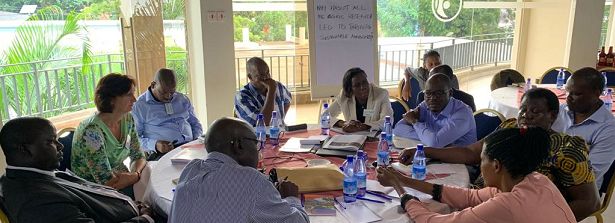Scaling opportunities workshop for Ugandan Applied Research Fund projects

Representatives of eight Ugandan Food & Business Applied Research Fund (ARF) projects – from research, the private sector, NGOs and governmental agencies – gathered for a country workshop in Kampala on June 18-20, 2019. Since most of the projects are finalized, it was time to take stock of the insights and outcomes, jointly reflect, learn and work on further uptake of results. The main theme was the issue of scaling innovations from food and agricultural research and how this can be enabled in Ugandan policy and practice.
The workshop was organized by NWO-WOTRO Science for Global Development, the Food & Business Knowledge Platform (F&BKP) and AgriProFocus. Exchanging knowledge, ideas and visions was facilitated through project pitches, a World Café, presentations, Open Space sessions, a panel discussion, and a field trip. In the lively discussions, the participants focused especially on gender in value chains, nutrition sensitive scaling, sustainable business development and climate smart scaling.
Please download the full report and watch the video.
The Ugandan ARF projects
Ten ARF projects, out of 45, have been implemented in Uganda from 2014 onwards. Almost all projects have been finalized. As all ARF projects, the Ugandan projects aim to contribute to food security and private sector development by demand driven and innovative research. Some of the projects focus on introducing or improving the production and value chains of crops like cashew nuts, sesame, cassava, rice, Green gram and tomatoes; others work on innovations in soil management, macro-nutrient fortification of cereals, strengthening agribusinesses ethics and seed systems for African indigenous vegetables. The approach used has similarities: multi-stakeholder collaboration with a strong focus on innovations that are developed and implemented in interaction with end users.
Learning and sharing of challenges and good practices
During the first project workshop day, three main topics were at the centre of attention: research impact assumptions; public-private partnerships; and scaling: scale out (impacting greater numbers), scale up (impacting laws and policy) and scale deep (impacting cultural roots). The participants actively discussed these issues based on their own experiences in a World Café session. This generated an interesting discussion on what is needed to navigate the complexity in bringing the results of food and agricultural research to scale.
Strengthening Ugandan Food and Nutrition Security in policy and practice
During the second day, the ARF project members were joined by a large number of stakeholders from the Ugandan agrofood sector, including representatives of policy, research, civil society and private sector, for a “public dialogue”. Discussions of the first day revealed a number of barriers that are hampering the scaling process, including a lacking enabling environment, limited access to finance, and the difficulties of capacity building. Therefore, the main discussion theme was: “What is needed from policy and practice for scaling out, scaling up and scaling deep of nutrition and agricultural research?” A representative of NARO, Hillary Agaba, mentioned that the main limitations to scaling in Uganda are the challenges in food distribution due to lacking infrastructure and the change needed in perceptions and attitudes. Abubakar Muhammad Moki, representing the Office of the President, confirmed that deep scaling, changing people’s mindsets, was needed before policy frameworks can be put into action. Feedback from the audience was however that efforts on policy implementation by the Ugandan government is lacking.
An open space session on different topics related to the needs from policy and practice for scaling, formulated questions for a panel discussion with representatives from the private sector, government, civil society, research and academia. When asked what the panellists could do (in their own capacity) to make sure food and agricultural research is being taken up and leads to jobs, food and nutrition, the panellists underlined the importance of creating an enabling environment for (e.g.) farming cooperatives. Furthermore they mentioned that Research for Development in Uganda is now too focused on research and should shift towards development, Finally they spoke about linking researchers with stakeholders from the private sector. Facilitator Julia Ekong summarized these comments as the need for space.
Field trip
At the final workshop day an interesting field trip was organized to a factory of the Value Addition Institute, partner of the Afri-Taste ARF project, that produces macronutrient (proteins from cow milk) enhanced cereals, e.g. corn and millet, which is available in supermarkets. Thereafter the Business Incubation Centre at Makerere University was visited, which offered interesting insights into how students are offered the opportunity to develop food products and are supported setting up viable businesses.






A lot of food is contaminated during and after harvesting because farmers are ignorant of how to handle the produce well.
Therefore, I think we need to train (especially small scale farmers) on how to effectively handle the food during and after harvesting to avoid contamination.
Thank you, Jero foods.